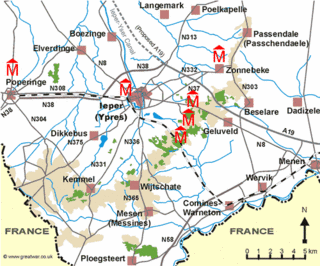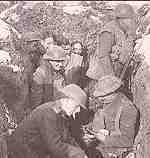Mons to Hill 60?

 Here's the next installment of Walter's account after Mons (and the ebony rosary) through Christmas and winter 1915:
Here's the next installment of Walter's account after Mons (and the ebony rosary) through Christmas and winter 1915:So the retirement from Mons took place on the 23rd August and continued until about the 7th September, when the British Expeditionary Force was able to reorganise and advance, as the Germans hesitated near the French Frontier, and they withdrew. We became mobile and carried skirmishes with the enemy during our advance. Night marches and we rested by day to avoid the reconnaissance planes that were in the vicinity. On the 31st October we were halted on our advance, and we divided into some cultivated fields and were deployed for “dawn attack” on the Germans at Messines. The London Scottish were also in their positions, and in the early morning, the attack took place. The Germans, who had the advantage of being on higher ground, soon got into action. We lost many men here, and we then regrouped, and continued on our forward march towards Ypres. There, the advance forward came to a halt, and everywhere became stalemate, and “trench warfare” became the order of the day.
We took up our positions up in Sanctuary Wood. This wood had been blown clean out, only the trunks of trees remained. We were relieved at intervals to go into billets. And at Christmas 1914, we were in a village called Kemmel, where we were found accommodation in the farmhouses and outhouses of the villagers. It was on this day that Queen Mary’s gift boxes were issued to us containing pipe and tobacco. I didn’t smoke, so I kept mine in my kit. This was a new sector we were now occupying, and the weeks went by until the Battle of Hill 60 in April 1915 took place. This is where the Germans used poison gas for the first time, and that caused gas helmets to be issued. We always carried that day and night.
I'm having some difficulty creating a timeline for Sanctuary Wood through the Battle of Hill 60 (does he mean Battle of Hill 62??) - just haven't found many resources to flesh out this time period. Did Walter remember the details correctly here? (Wish I had the History of the Lincolnshire Regiment 1914-1915 at hand!)

2 Comments:
At 7:18 PM , Gray Moon Gallery said...
Gray Moon Gallery said...
Belgian artist Jan Theuninck made an abstract painting of the trenches at Hill 60 and wrote a poem about it :
www.flickr.com/photos/26915283@N07/2536174535 /
At 2:51 PM , MaryB said...
MaryB said...
Amazing painting and poem. Thanks for pointing me to it!
Post a Comment
Subscribe to Post Comments [Atom]
<< Home